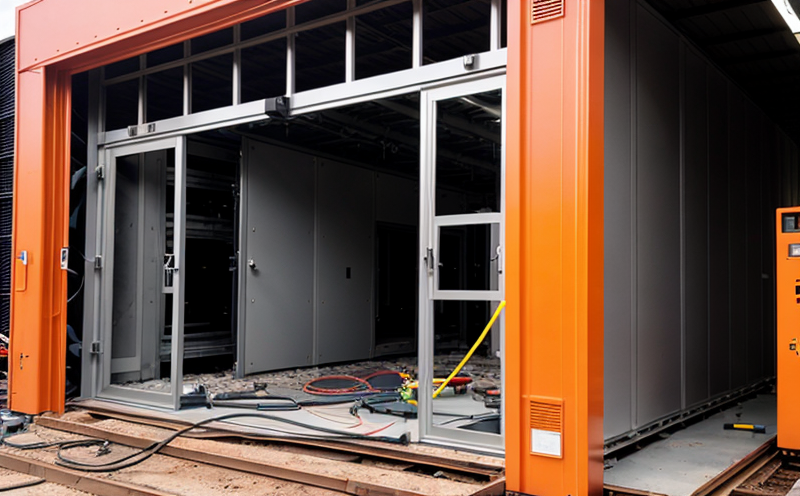ANSI C18.4M Thermal Management Testing of Household Battery Systems
The ANSI C18.4M standard is a cornerstone in ensuring the safety and reliability of household battery systems, particularly those used in energy storage and renewable applications. As quality managers and compliance officers grapple with the increasing demand for safer and more efficient battery technologies, this testing protocol provides the necessary framework to evaluate thermal management performance.
The ANSI C18.4M standard is designed to ensure that batteries can withstand extreme temperatures without compromising their integrity or posing a risk of fire or explosion. This test evaluates the thermal stability of household batteries by subjecting them to a range of temperature and humidity conditions, simulating real-world environments where these systems are likely to operate.
During testing, the battery is exposed to controlled heating cycles that mimic operational stress scenarios. The goal is to assess how well the system maintains its structural integrity and electrical performance under these conditions. This includes monitoring key parameters such as internal temperature rise, voltage changes, and resistance levels throughout the test duration.
The testing process involves precise specimen preparation which includes placing the battery in a specially designed chamber capable of maintaining stable temperature and humidity levels. The chamber is equipped with sensors to continuously monitor environmental conditions during the test run. Once prepared, the battery undergoes several cycles of heating and cooling, each cycle lasting for an extended period.
The results from these tests are critical for manufacturers as they provide valuable insights into potential weaknesses within the design or manufacturing process. By identifying issues early on through rigorous testing, companies can refine their products to meet stringent safety standards while enhancing overall performance.
Compliance officers will find this service particularly useful when seeking assurance that their product meets regulatory requirements set forth by ANSI C18.4M. For R&D engineers, this test offers an opportunity to optimize design parameters based on actual performance data obtained during testing. Additionally, procurement professionals can leverage the results of these tests as part of supplier evaluation criteria.
One key aspect of ANSI C18.4M compliance is understanding the specific requirements outlined in the standard. These include establishing upper and lower temperature limits within which batteries must function properly without exhibiting signs of failure or hazardous behavior. Another important consideration is ensuring that all components used in constructing household battery systems adhere to these stringent guidelines.
Industry applications for ANSI C18.4M thermal management testing extend beyond just consumer electronics into various fields such as electric vehicles (EVs), solar power installations, and grid-level energy storage solutions. By implementing this standard across different sectors, manufacturers can contribute towards creating a safer environment by reducing the risk of fires caused by overheating batteries.
In conclusion, ANSI C18.4M thermal management testing plays an essential role in safeguarding public health and property safety while promoting sustainable development goals related to renewable energy sources. It offers comprehensive evaluation methods that help manufacturers create robust household battery systems capable of enduring harsh operating conditions without sacrificing quality or reliability.
Applied Standards
| Standard Code | Title |
|---|---|
| ANSI C18.4M | Standard Specification for Lithium-Ion Battery Systems for Home Energy Storage |
| Parameter | Description |
|---|---|
| Temperature Range | -20°C to +65°C (standard conditions) |
| Humidity Levels | 10% RH - 90% RH (standard conditions) |
| Test Duration | 48 hours continuous exposure |
| Data Collection Frequency | Every minute during test period |
Industry Applications
| Application Area | Description |
|---|---|
| Home Energy Storage Systems | Ensure safe operation of batteries used in residential solar installations and backup power systems. |
| Electric Vehicles (EVs) | Evaluate thermal stability during charging cycles to prevent overheating risks. |
| Solar Power Installations | Test battery performance under varying environmental conditions to optimize system efficiency. |
| Grid-Level Energy Storage Solutions | Provide critical data for large-scale deployment of batteries in utility networks. |
The ANSI C18.4M standard finds extensive application across multiple industries, including renewable energy and automotive sectors. Its focus on thermal management is crucial given the growing demand for sustainable technologies that can operate reliably even under challenging environmental conditions.
Why Choose This Test
The ANSI C18.4M thermal management testing offers several advantages over other methods of evaluating household battery systems. Firstly, it provides a standardized approach that ensures consistent results across different manufacturers and models. Secondly, by simulating real-world scenarios, this test helps identify potential weaknesses early in the development process before they become costly issues during production or deployment.
Another advantage is its ability to provide detailed performance data which can be used for continuous improvement of product designs. This information is invaluable for R&D teams looking to enhance both safety and efficiency aspects of their offerings. Furthermore, compliance with ANSI C18.4M standards enhances brand reputation among consumers who value high-quality, safe products.
Lastly, choosing this test ensures adherence to international best practices recognized by regulatory bodies worldwide. This not only facilitates easier market entry but also builds trust between stakeholders involved in the supply chain.





